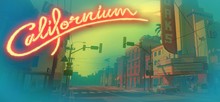Californium (PC) Review
By Athanasios  30.05.2016
30.05.2016

Californium… is weird. Then again, how could a tribute to Philip K. Dick not be weird? Additionally, and judging from the numerous awards it has been given, it must be good, too, right? Well, the thing is that winning an award is not exactly the best indication of quality, especially with those heavy on striking aesthetics and strange and "artsy" concept indie productions, which tend to forget the thing that matters the most: gameplay.
The very first screen of this adventure has led yours truly in a Google search for a way to "move past the typewriter scene;" a taste of things to come, with the total lack of hand-holding being one of the many unconventional ways Californium handles the video game medium. Oh, and by the way, the screen mentioned before actually requires typing the words that slowly appear on paper; a segment that will make everyone but Dickheads scratch their heads.

Hey, calm down, calm down! The D-word is just what some fans of Philip K. Dick tend to call themselves, with this title being nothing more than a homage to the highly biographical work of this fantastic science fiction writer, evident by the protagonist's marital troubles, his issues with substances, and his weird experiences concerning the very fabric of reality.
Now, remember the 'Winners Don't Use Drugs' slogan of the arcades of old? Please follow this advice, especially when approaching this game. It's hard to describe the world that Elvin Green inhabits; simple, yet colourful, and mundane, but, at the same time, dreamlike. His '70s neighbourhood, as well as the rest of the places that the protagonist will… travel to are quite detailed, but almost every freaking surface has a solid colour instead of a texture, with the end result looking a bit like a mixture between Art Deco, a Soviet Union propaganda poster, and a psychedelic rock album cover… if that makes any sense.

Coupled by a moody, ambient OST, this bizarre look creates quite the magnificent, otherworldly atmosphere, and if this wasn't enough, upon walking through the living room, the TV set will turn on and start talking to Elvin about how he can use, err… the 'Force' or something (it's never explained), and look "beyond the veil." Unfortunately, while this sounds promising and all, this is where the Art-Deco-Soviet-Union-propaganda-poster-psychedelic-rock-album-cover S-word will hit the fan.
For starters, there's not really a plot. Elvin will enter parallel dimensions where, apart from certain constants, he will have a supposedly different past, but nothing will ever really happen over there, with character interactions usually offering simplistic exposition for the player in order to understand why, instead of the funky and colourful '70s, the world has transformed into a blue-coloured fanfare of right-wing über-patriotism… or something even weirder.

In reality, this is just a chase for the Greek "Thetas" that are hidden around, with the aforementioned TV sets marking how many are in close proximity. Simple idea, sure, but the problem lies more in its execution, since, instead of relying on something "solid" to find them, one must randomly run around and fiddle with the environment or look in all directions in order for a Theta to appear. Very few of these symbols require a more careful observation of the surrounding space, but, as a whole, this is a completely aggravating chore that has nothing to do with skill.
The final nail in the coffin is that while Californium is marketed as a homage to the works of Philip K. Dick, it's just slightly inspired by it. Apart from the themes of parallel dimensions, unknown alien entities pulling strings from the shadows, schizophrenia, and drug and alcohol addiction, this generally presents arms in very subtle ways, usually by reusing various names or anagrammatisms (*sigh*) from the novels - and nothing more than that, to be honest.

Cubed3 Rating
Average
Californium is a labour of love that didn't even try to do a fine job at using the thing it loves the most. It makes promises of offering a plot-heavy adventure that is heavily inspired by Philip K. Dick, when it's just marginally influenced by it, and, even worse, gameplay-wise, it is a frustrating hidden object game, which becomes less so due to its gorgeous, wallpaper-worthy visuals.

![]() 5/10
5/10
![]() 0
(0 Votes)
0
(0 Votes)
 Out now
Out now  Out now
Out now  None
None  Out now
Out now Comments
Comments are currently disabled

 Sign In
Sign In Game Details
Game Details Subscribe to this topic
Subscribe to this topic Features
Features





 Top
Top

